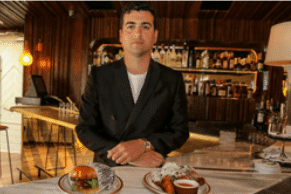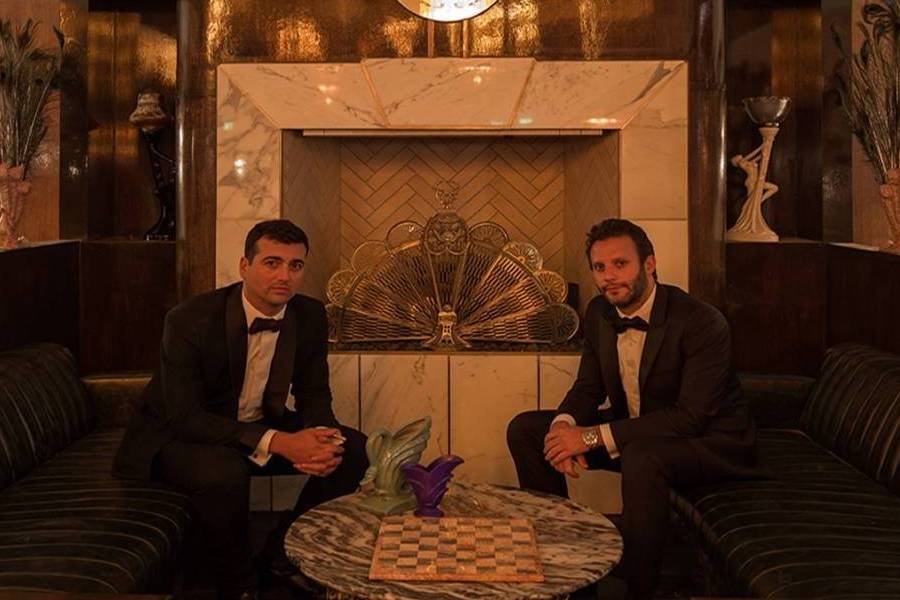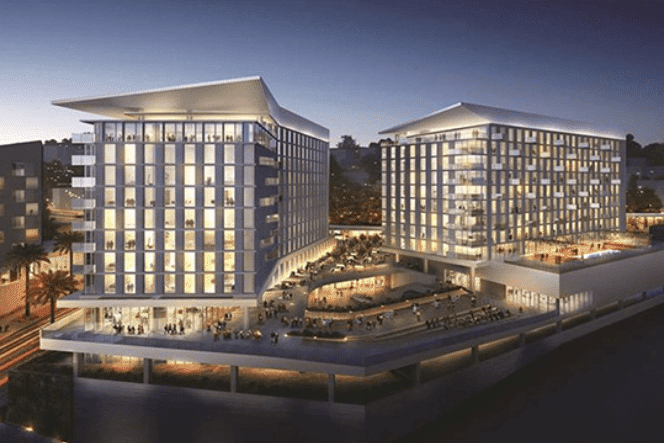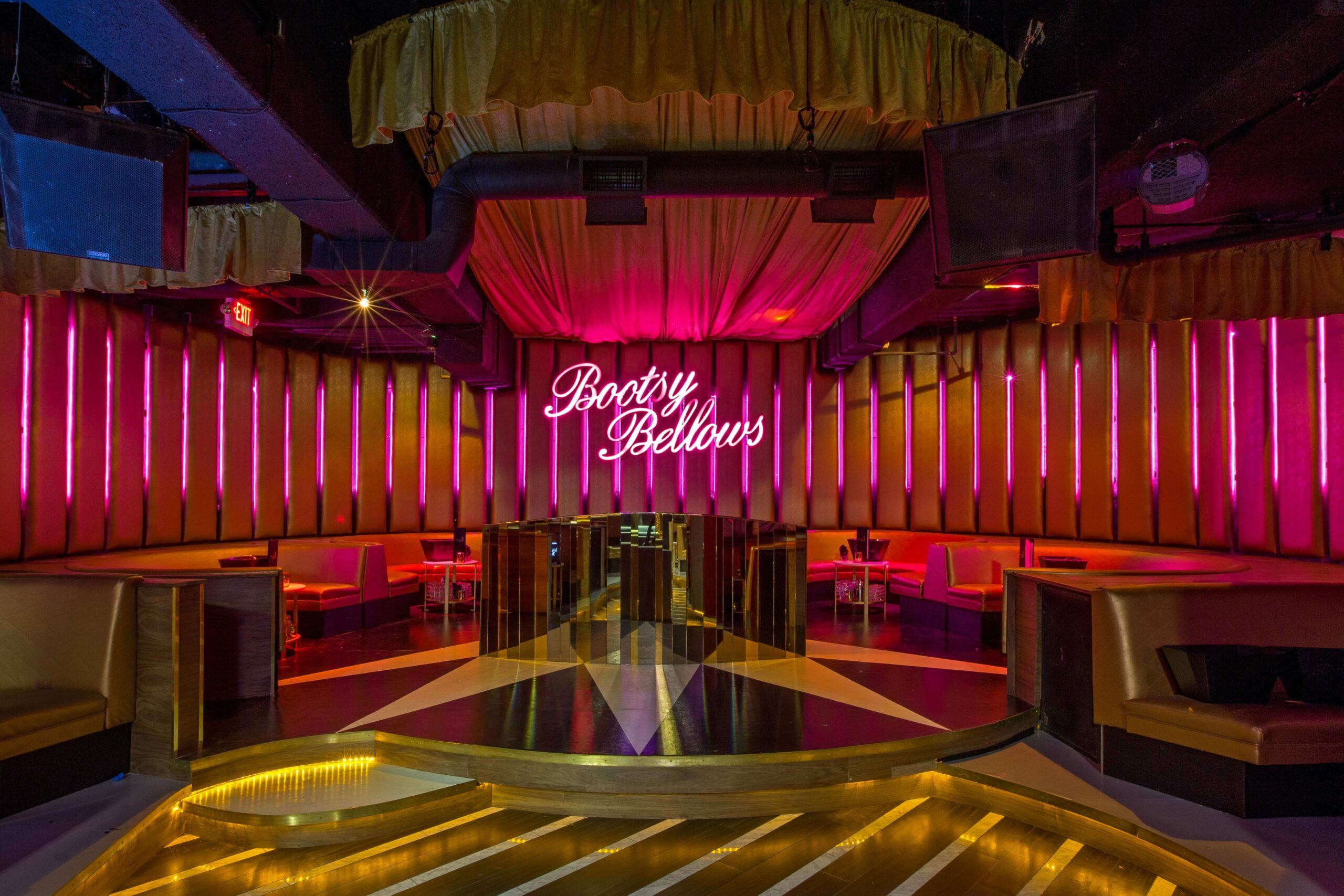H.Wood Group’s John Terzian Dishes On What It Took To Build A $35M Nightclub And Restaurant Business
WITH DELILAH, THE H.WOOD GROUP CHANNELS THE UNABASHED GLAMOUR OF
TINSELTOWN PAST.
John Terzian cofounded The h.wood Group a decade ago with his friend Brian Toll with one club in Los Angeles that ended up being shut down by the city as a public nuisance. Rather than give up, Terzian, now 37, set out to learn what he didn’t know. Today, he’s one of Los Angeles’s best-known nightclub impresarios with a knack for getting celebrities like Drake, Katy Perry, Justin Bieber and Jessica Alba into his venues. Less well-known: The h.wood Group has become a substantial business with its mini-conglomerate of clubs and restaurants – including Bootsy Bellows, Shorebar, Blind Dragon, The Nice Guy and The Peppermint Club – and private events ringing up more than $35 million in revenue last year. This year, with two new concepts opening in L.A., plus a new eatery in a Chicago hotel, Terzian expects the group’s revenue to reach $50 million. In an interview that has been edited and condensed, he spoke about what makes a successful nightclub, his plans for expansion, and selling a stake in the business to global lifestyle company Hakkasan Group three years ago.
Amy Feldman: How did you get into the business?
John Terzian: I grew up in L.A. and went to USC. I was a walk-on at the football team, and they had me do the recruiting. I would take restaurants that were not doing well in L.A., and bring recruits there to woo them with parties. I never planned to go into it. I went to law school. After law school, my friend was a struggling DJ and he wanted me to work with him. I traveled to every bar and event in the world. Then I opened my own place in 2007 called H.Wood in Hollywood. It was a little ahead of its time.
Feldman: Why?
Terzian: I always knew how to bring a crowd. We had major crowds – so much so that we were declared a public nuisance and they shut us down. I lost my investors’ money. It was a horrible, horrible time. I had to move home.
Feldman: What happened?
Terzian: We would bring big crowds and paparazzi, and the neighbors would complain. The city declared it a public nuisance. They went in and locked the gates. At the same time, I had opened another club down the street called Las Palmas. Because of the city’s issues with H.Wood, they kept coming and trying to mess with Las Palmas. It was a constant fight with the police. We eventually sold it. We didn’t know how to deal with neighbors and cities.
Feldman: What did you learn through that process?
Terzian: When I open a place now there are a million things I do – going to neighbors, soundproofing the design. I can recite the decibel level ordinances in each division of L.A. I learned all that in a very rough and hard way, but luckily it was early in my career. We knew how to bring in a crowd, but we didn’t know how to operate. We would do huge numbers and be left with next to no profit. That’s why nine out of 10 restaurants fail. You get caught not knowing about inventory and payroll. You can really run a business into the ground. We had to learn all that.
Feldman: How did you come back?
Terzian: I found an old, gross bar in Santa Monica. I convinced the landlord to give it to me and put the money in for me to redesign. They gave me a shoestring budget. That turned into Shorebar. And that was the turning point for me and h.wood. That was six years ago. Shorebar kind of revolutionized the Westside nightlife scene. Then we got lucky to get a space on Sunset and created Bootsy Bellows. It took awhile to get into restaurants. The concept for the Nice Guy was we had all these influential people who couldn’t go to nightclubs every night. We wanted to create a private restaurant thing. There’s a Rolodex of approved names that get reservations. We have another restaurant called Delilah, which is bigger and more loungey with a Gatsby vibe. And we have a karaoke bar called Blind Dragon that we licensed and opened in Dubai.
Feldman: How many restaurants and clubs do you have in total?
Terzian: Seven right now. This month we’re opening a new nightclub called Poppy and a new Mexican restaurant called Petit Taqueria. Those two are in L.A.
Feldman: Has it been difficult to expand beyond L.A.?
Terzian: We opened in Aspen about four years ago. It honestly took us two years to figure out how to operate outside of L.A. We partnered with a good local operator. We’re doing the restaurant and bar in a hotel chain called Found that’s opening in Chicago and then San Francisco. The restaurants will be called Mason.
Feldman: Chicago couldn’t be a more different market than L.A.
Terzian: It’s different than L.A., but that’s fine for us. It’s a great market. We also love Dallas. We’re opening a Bootsy Bellows there.
Feldman: What makes a good nightclub or restaurant?
Terzian: It’s a weird X factor that’s hard to describe. It’s a mix of the vibe in the room, the people and the ambience. The nightclub world changes constantly. Hip hop is really big now, so having surprise performers, like Drake, is big. At Bootsy’s, we have puppets walking around. We have crazy characters constantly entertaining the crowd.
Feldman: Have you had venues that haven’t succeeded?
Terzian: I’ve had a handful of failures. We had a venue called Henry’s that just didn’t work out. As cool as it looked it never had the extra thing. We tweaked it every which way, and it never worked. The Peppermint Club is now in the space where Henry’s was, but it is drastically different. It’s a throwback to live music venues from the ‘60s with an amazing stage and sound system and island bar. We partnered with Interscope on that to get that extra music credibility.
Feldman: Which one of the places is your personal favorite?
Terzian: It’s between Nice Guy and Shorebar. Shorebar is the baby that started it all, and Nice Guy is my dream of why I got into this business.
Feldman: What are revenues?
Terzian: Currently, about $35-40 million for everything.
Feldman: You have both venues and events. Which side of the business is larger?
Terzian: The venues are larger than the event business, but the event business is more profitable.
Feldman: Is there an event that’s been your favorite?
Terzian: Man, there’s been a lot. We just helped the Billboard awards in Vegas. Drake performed in the Bellagio fountain, and that was all done by us. A key event early on was Mike Deluca’s Oscar party for “Captain Phillips” [the movie starring Tom Hanks] at a mansion in Beverly Hills. We have some presence at a majority of the events – Coachella, Sundance, Formula One, Grammys, Oscars, Cannes Film Festival. Coming up for 4th of July, we have a big one at Nobu Malibu that we do as a Bootsy Bellows pop-up. It’s a big daytime party, and we have a surprise performer every year.
Feldman: What are your expectations for 2017?
Terzian: By the end of 2017, we’ll have 15 places. We’ll probably grow to over $50 million.
Feldman: You sold a piece of the business to global lifestyle group Hakkasan three years ago. Why?
Terzian: We did it for two reasons: growth and strategic. They took a 51% stake, but now they have dropped to a minority stake. They got diluted. We kept operating control. It’s just them and one other private individual, and then us, Brian and me.
Feldman: How much do you and Brian still own?
Terzian: 46%. We’re equal. In individual places, we also have given equity to people. David Arquette owns a chunk of the Bootsy Bellows brand, but not h.wood Group.
Feldman: What’s next?
Terzian: The goal is hotels. Everything I am doing is geared toward hotels. We’re in the middle of trying to buy one right now. You have to buy an existing hotel and then remodel it. You can’t really do ground-up anymore.
Feldman: Where do you want to open?
Terzian: The West Hollywood area. I think we need to start in our backyard.
Feldman: Do you have a name and a concept set up?
Terzian: We do. I think it’s too early to talk about, without the location.
Feldman: I read an interview with you where you said that your favorite food is chicken tenders.
Terzian: That is true. At my wedding one of the options was a chicken tender meal, and it was a black-tie wedding. I wear only black all day every day with tennis shoes, and I eat chicken fingers as my main meal. We have some amazing chicken tenders at Delilah because of me.




